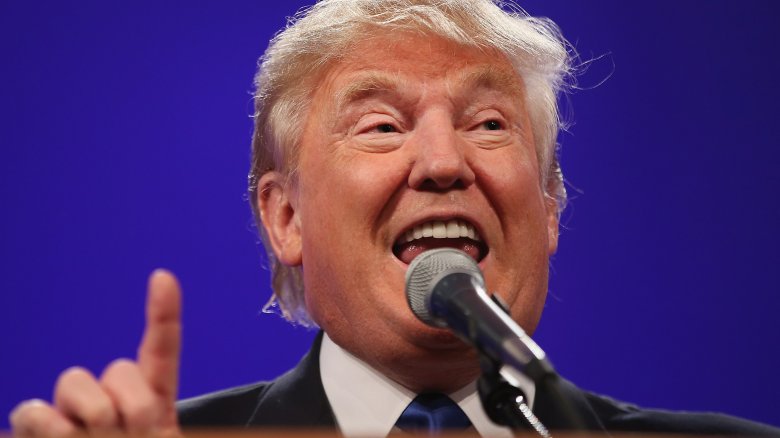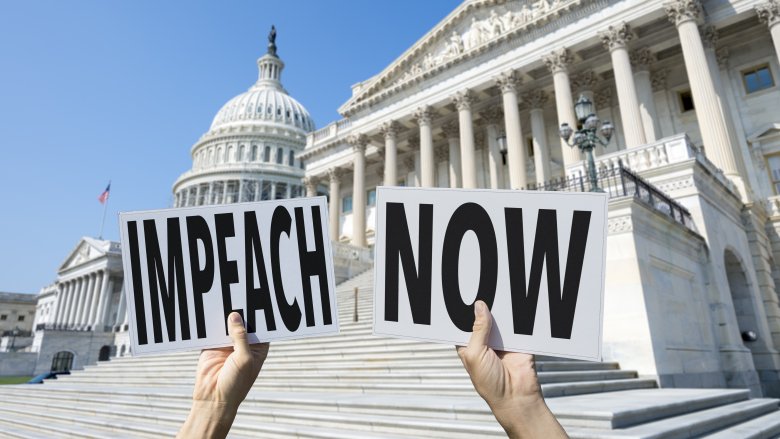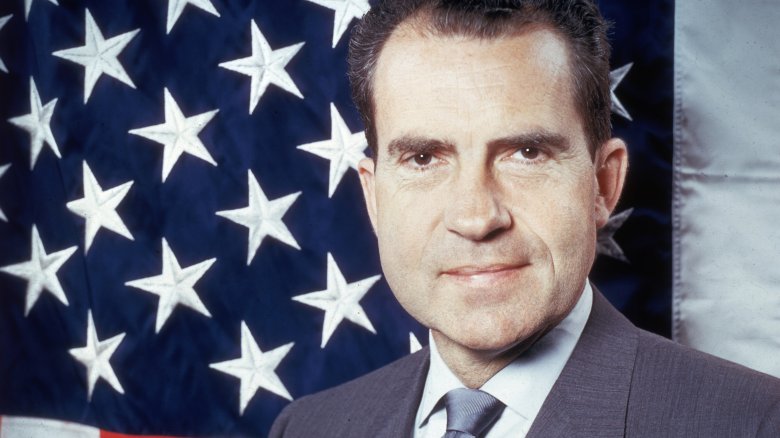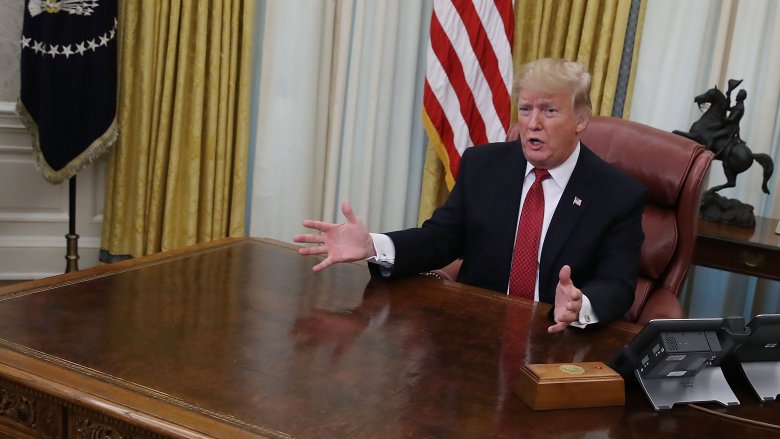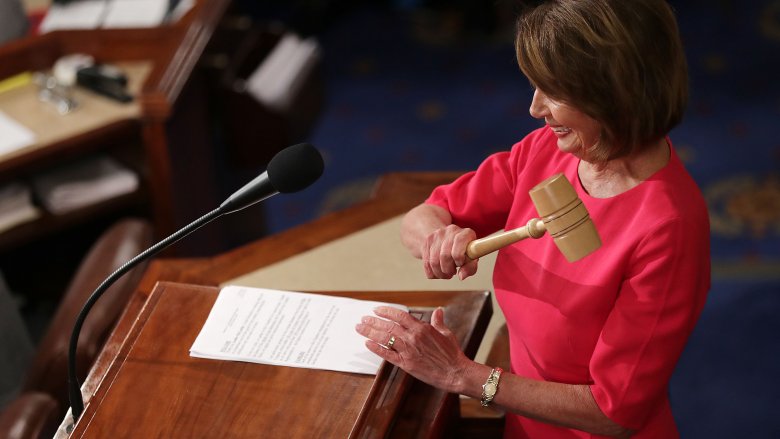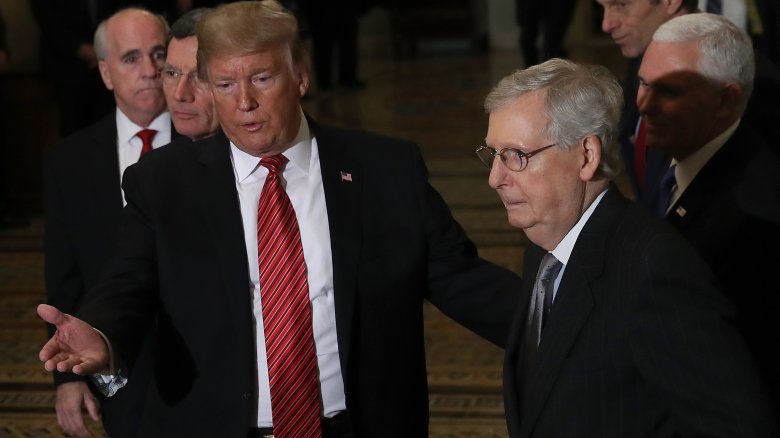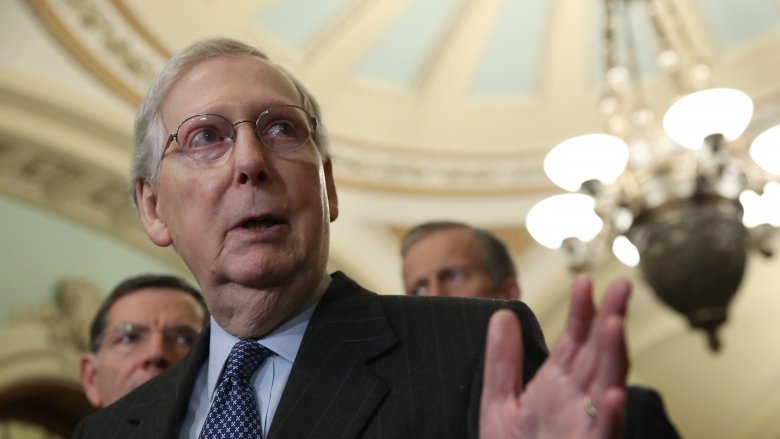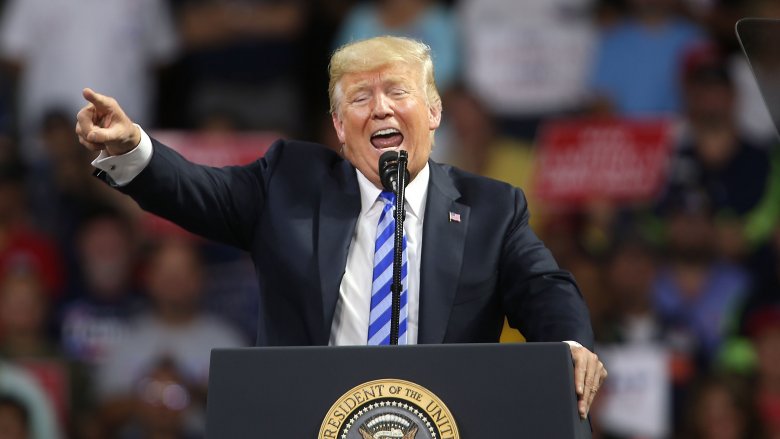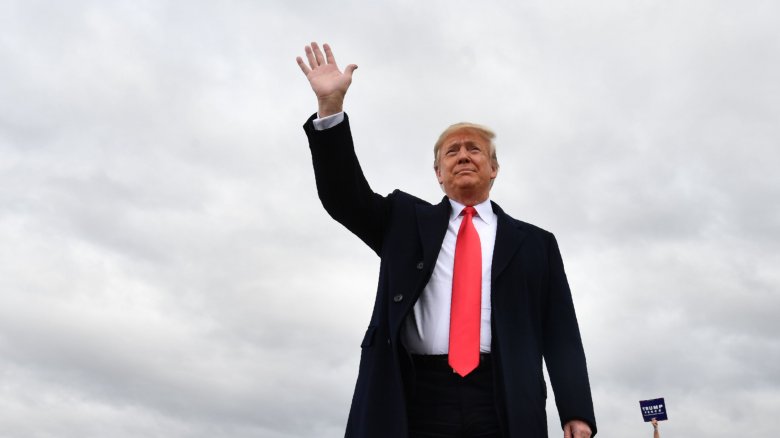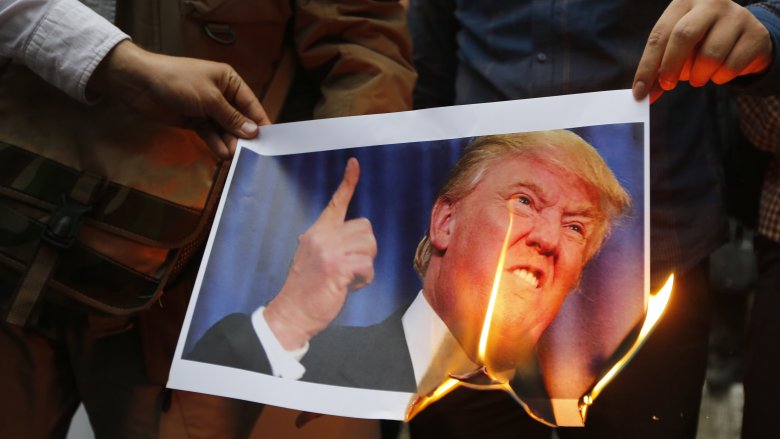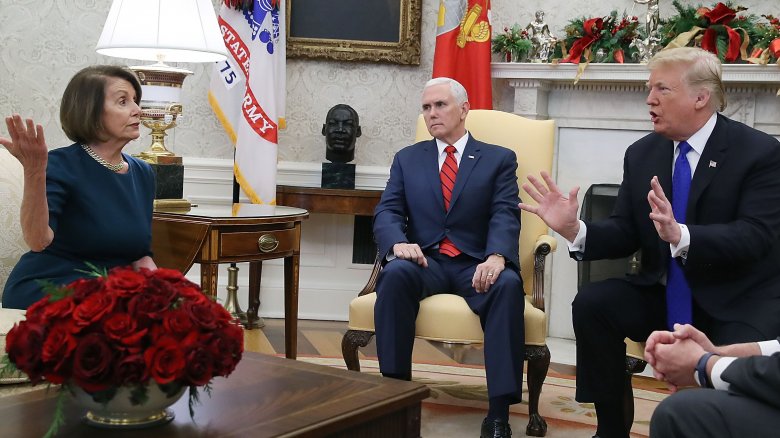What Will Really Happen If Trump Is Impeached
The United States is not a monarchy. While the Founding Fathers couldn't have prepared for everything and they certainly made some big mistakes, one area they were especially clear on was limiting the power of the presidency. Though certain presidents might talk big and authoritarian, the presidential position is supposed to be one of servitude to the people: the U.S. put you in there, and the U.S. can kick you out.
To ensure that any possible tyrants could be bumped to the curb, the Constitution enshrined a process called impeachment. Not many former presidents have been impeached, but whatever your political stance might be, you probably always knew there was a chance that President Donald Trump could be put in the hot seat. After Robert Mueller wrapped up his exhaustive investigation, some Democrats began calling for impeachment even more loudly than before. And a certain phone call to Ukraine has finally set the impeachment ball rolling. So what happens next? How does the whole process work? Here's the deal.
What is impeachment, anyway?
The word "impeachment" gets thrown around a lot, but most people don't know exactly how it's defined, probably because of the muddled hubbub around Bill Clinton's impeachment in the 1990s. As the Guardian explains, impeachment is a process by which Congress can put the U.S. president — or other powerful government officials, like Supreme Court justices — on trial, at which point they decide the official's fate. Note that impeachment doesn't mean that a president goes to jail, or even that they're necessarily kicked out. Impeachment just means they're on trial, and if they're judged guilty, both of those threats can become realities. Ideally, impeachment is a way to ensure that the president is never above the law.
For Congress to launch the impeachment process, they need serious allegations in one of three categories: treason, bribery, or the vague "high crimes and misdemeanors." Vox points out that in the past, impeachment efforts that aren't based on serious criminal allegations have never gotten far. So you can't just impeach a president because you don't like a certain policy decision: There needs to be evidence of criminal wrongdoing.
How many times has this happened?
Impeachment almost never happens because it's a huge deal. Politicians are obnoxiously good at squeaking between rhetorical gray areas, so for the country's top politician to come under legal fire requires pretty intense allegations, evidence, and at least some degree of public support for the impeachment. That said, the trigger has been pulled a few times. President Andrew Johnson was impeached for firing Cabinet officials without Senate approval in the wake of the Civil War and was acquitted by only one vote. Over a century later, Bill Clinton was charged with both obstruction of justice and lying under oath. He was rather easily acquitted.
Ironically, Richard Nixon, probably the president most popularly associated with impeachment, was never impeached. When Nixon's spiral of corruption caught up to him and Congress began the impeachment process, Nixon's response was to put in his resignation, hit the road, and disappear. Don't worry, Gerald Ford pardoned him for all his crimes.
What would Trump be impeached for?
These days, President Trump might be pretty close to impeachment, and that's because serious criminal accusations have been made against him. But first, remember the Mueller investigation? Doesn't that seem so long ago? It did not find evidence of "collusion," so a charge of conspiracy regarding Russia was basically out.
However, there was the fact that Trump, through lawyer Michael Cohen, made hush money agreements to influence the 2016 election, according to the Guardian. As Vox points out, Trump could have been charged with obstruction of justice for attempting to interfere with the investigation (e.g., firing James Comey). The Guardian speculated it was even possible that Trump could be implicated in as many as nine impeachable offenses. Regardless, that went nowhere.
But in the fall of 2019, America learned about a phone call between President Trump and Ukrainian President Volodymyr Zelensky, thanks to a whistleblower. Did Trump illegally offer favors to a foreign leader for dirt on political opponent Joe Biden? The hearings in the House sure made it look like it, and the vast majority of Americans thought so. Plus, issues of obstruction and witness intimidation were raised. But as of this writing, it's not clear what, if anything, will come of it all.
Can a sitting president face criminal charges?
Well, it's complicated.
On at least two occasions in the past, according to NPR, the Justice Department has stated their official position that a sitting U.S. president cannot be charged with any crimes until they leave the office — whether by choice, a lost election, or by force. Now, not everybody agrees with this stance. As usual, different experts all have different ideas, and the debates get pretty intense. So far, though, that's been the policy, and any challenge to that would probably involve a lengthy path through the courts. This is why impeachment is a vital way to ensure democratic norms. Once a president is impeached in the House — which is looking more and more likely for Trump — it means they have to stand trial in the Senate. Whether that's fair or not, it's likely how things would proceed, as far as any criminal charges against Trump might go.
Impeachment starts in the House
After the whistleblower came forward about the phone call with the Ukrainian president, Nancy Pelosi's House of Representatives finally took notice. Now the details are being investigated by the House Judiciary Committee. At this point, nothing is officially confirmed, and nobody is impeached: Think of this stage as being a lot like those tense moments when you first get pulled over, and the cop runs your license plates before exiting the car.
If the Judiciary Committee decides the evidence looks bad for President Trump? It's time to vote. After all, that's the American way. The entire House of Representatives will vote on what are called "articles of impeachment," with each article representing a different charge the president is accused of. If enough of the House votes on at least one of these articles of impeachment then the president is officially impeached. Ta-da! That doesn't mean he's removed from office, though. Then the action would move to the Senate, where Majority Leader Mitch McConnell suddenly has a lot of work to do.
The trial begins
Get out the popcorn because the big show is now underway. While the hearings in the House have had a few bombshell moments, everything changes when the Senate is in the driver's seat. At this point, as Vox explains, the Senate is quite literally holding a trial against the president of the United States. So if you thought the Kavanaugh hearings ruined tons of family dinners across the nation, the point where Trump's impeachment goes to the Senate would be a thousand times bigger.
Here's how it works. The House becomes the prosecutor, while the president's lawyers are the defense team and the Senate is the jury. Presiding over the case would be Supreme Court Chief Justice John Roberts, but the Senate does have the power to overrule his judgments. From here on out, the action will probably resemble a stereotypical court case, with witnesses being called and so forth. In the end, the Senate holds a vote on whether to acquit or convict the sitting president. For the president to be removed from office, a full two-thirds of the Senate has to vote to convict him. That's no small number, for sure, and in the cases of Johnson and Clinton, this is where their impeachment cases ended with acquittals. That's why the Senate is the main place where Trump's opponents face their biggest obstacle.
Yes, the outcome would depend on Republicans
Here's the key thing to remember even if Trump does get impeached: For him to actually be convicted — and as a result, removed from office — it would require a rather large number of Republican Senators to turn against the president, according to CNN.
While the 2018 election put the House of Representatives in the hands of Democrats, the Senate is still owned by the GOP. That means while the House will probably end up voting to impeach Trump when the time comes, two-thirds of the Republican-dominated Senate has to make the call to convict him or the whole thing becomes a false start. For those doing the math, getting that two-thirds majority would require all existing Democratic Senators to vote to convict, plus 20 Republican Senators would need step across the aisle to join them. Is that impossible? Of course not. But it does mean that charges against Trump would need to be seen as so severe that the majority of voters from his own party go against him. That said, such a thing did happen with Nixon, so it is possible.
Would Trump go to prison?
Weird as it is to visualize, the possibility of impeachment does carry real-world consequences for any U.S. president, Trump included. Australian Broadcasting Corporation points out that several major politicians have warned that if Trump is found guilty, jail time is a genuine possibility.
On the other hand, what if Trump isn't impeached? What if he continues serving as president until 2020 or 2024? Even then, he's still not out of the woods, according to Rolling Stone. Legal charges are piling up around him, and while he might not be prosecuted as a sitting president, that shield would disappear once he leaves the White House. In other words, an ex-President Trump could be embroiled in criminal legal disputes from the minute he steps down, meaning the next U.S. president could have to make a decision on pardoning Trump. That's what Gerald Ford did when Nixon resigned, hence why Nixon never faced the music ... and if you know your history, you also know it didn't go well for Ford when he tried to get reelected.
Trump could resign first
If Trump ends up in the same hot water as Nixon, it's entirely conceivable that he might try the same tactic of resigning from office before being removed against his will. After all, it worked for Tricky Dick. But this move depends on his VP-turned-president pardoning him like Ford did, and as mentioned, that could be risky for Mike Pence's future. If Trump doesn't feel safe in Pence's hands, he could try to stir the pot, distracting the nation by inciting a military or foreign policy crisis. That's another Nixon move, according to Newsweek, but it didn't work for Nixon and it's unlikely to work for Trump. Impeachment is a serious matter. People aren't going to look the other way.
On the other hand, former George W. Bush adviser Alan Steinberg has predicted a rather unusual third possibility: Steinberg believes if the water gets too hot and Trump is facing the possibility of real jail time, he might strike an unprecedented deal with all relevant authorities. Steinberg predicts he could agree to resign from the presidency in exchange for immunity for himself, his company, and his children. This move, should all parties agree to it, would probably be the only way for him to dodge charges, if they were severe enough. His opponents would have to shake hands on something totally unheard of, though. This sounds hard to imagine, but hey, it's been a bizarre last few years in the United States.
Trump's dire predictions
As for Trump himself, he's made some rather apocalyptic forecasts about what would happen if Congress throws him under the bus. Though he claimed that he's "not concerned" about the possibility, according to Politico, he did argue that the country would revolt if he got impeached. The Daily Beast reports that his former lawyer Rudy Giuliani made similar predictions. On other occasions, Trump has gone so far as to forecast widespread economic ruin if he's impeached, stating that the market would crash and "everybody would be very poor."
Of course, Trump and Giuliani are a bit biased on the subject. For one, MarketWatch did the math on Trump's gloomy stock predictions and determined that the market impact of an impeachment would probably be negligible. Furthermore, there was no national crisis of the sort Trump describes when Clinton was impeached, and whatever your current opinion of Clinton, he was quite popular back in the 1990s, according to Gallup. While the U.S. is admittedly more polarized now than it was then, and a Trump impeachment or conviction would certainly set the internet on fire, it's incredibly unlikely that it would be a cataclysmic event of the sort Trump describes ... for anyone but Trump and his associates, anyhow.
And then, here comes President Pence
Okay, so imagine a world where Trump does get impeached, removed, and imprisoned. Who becomes president? You know the answer: Vice President Mike Pence, former governor of Indiana, an extremely polarizing politician. According to Fortune, Pence then has freedom to choose a new VP (subject to Congressional confirmation), and in 2020, he probably runs for election as the GOP candidate. Now, if he wins? Then he gets to run again in 2024. Hypothetically, if Pence passes on the position — and yeah, right, considering that he's apparently been coveting the presidency his whole life, according to a spotlight in the New Yorker — or he's implicated in the Ukraine mess and goes down with Trump, then the next person in line to the presidency is Speaker of the House Nancy Pelosi. Hey, crazier things have happened. What a time to be alive.
